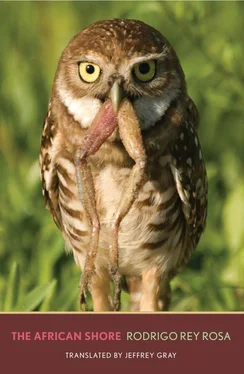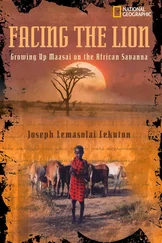He walked as far as the Plaza de España, looking back from time to time, but he didn’t see the Moroccan. The streets began to get livelier; the siesta hour was past. As in Tangier, human activity here was cheered by the cries and twitters of birds.
The Plaza de España had a Catalán flavor, but the tiles and stucco facades couldn’t offset the ugliness of the garish advertisements for travel agencies and other businesses. Although he had already bought a ticket for the ferry to Almería, at that moment he decided to change it for one to Málaga. He went into an agency on Pablo Valesca Street and, confirming that the difference in price between the ferry and the plane was negligible, decided to fly to Málaga. It would be more difficult to follow him, he thought — if in fact someone was following him.
But it was absurd to keep thinking this, he told himself, as he came out onto the street and looked in all directions, trying to spot the Moroccan among the Spanish crowd. He walked up the esplanade of General Macías toward Medina Sidonia, drawn by an unaccountable nostalgia, that sense of loss that he had felt only in Tangier.
He turned up a winding street toward the chapel of Santiago el Matamoros, until he came to a small fort that reminded him of the fort of Xáuen but that turned out to be the municipal museum. It was closed, so he walked the length of the rampart and found a little Moroccan market. He remembered the day he’d gone with Julie to Xáuen. A little after that, the Frenchwomen had gone back to Paris, practically leaving him in the street. He could understand that Mme. Choiseul wouldn’t invite him to stay in her house. Still, he had entertained the fantasy. Afterward, he spent several weeks waiting for news from Julie, and one day he finally got some: she had a new boyfriend in Paris. Would he still be in Tangier in the spring when she planned to come back? Probably not, he answered; he didn’t hear from her again.
To avoid the stairs he’d taken on the way up, he walked down to the Plaza de la Avanzadilla by a dark lane that came to a fork; the branch he chose, the wider, like so many lanes in the Tangier Medina, went on narrowing little by little, until it turned into a kind of family courtyard. A black cat was chewing noisily on a piece of fish. Shouts came from a window, then a child’s laughter.
He turned to go back up the lane, when the Moroccan, who must have been following him at a distance all this time, blocked the way.
“Excuse me,” he said in panic. His gut clenched.
The other didn’t move.
“Do we know each other?” His voice sounded broken. He swallowed acid saliva.
“You bet I know you, hombre. ” An unexpected accent.
“Really?” He inhaled. “Sorry, I don’t remember. What was your name?”
“Ángel Tejedor,” said the other very clearly.
“How’s that?” Something strange happened inside him. The burning he felt in all his pores was adrenalin from the shock. His legs began to tremble, slightly but uncontrollably. This, Ángel Tejedor, was his own name. “Is this a joke?” he managed to say.
“No joke.”
He backed up two paces. He felt a sharp cramp in his stomach.
“What do you want?”
“Nothing.”
“Rashid sent you?”
The other shook his head. He took a long knife from under his jacket.
“Let’s have it,” he said. “The passport and the ticket.”
He took the ticket out first; then, reluctantly, his passport.
“Put the ticket inside the passport and throw it on the ground here beside me. Right here beside me.”
Then he told him to take off his shoes. Curiously, this calmed him. The Moroccan took his shoes and threw them high in the air. He could hear them fall on a rooftop.
“Get down on your stomach.”
He started to obey, bending forward, but all at once he understood that the man was going to kill him, that he had to kill him if he was going to become him. He flung himself forward against him, and they fell to the ground in each other’s arms. An unknown, unpleasant odor. But there was something liberating, almost pleasurable in the elemental struggle: his fear dissolved. The black cat shot up the alley. His hands turned into claws, and his enemy’s long hair into an advantage as he seized it hard and yanked it, knocking the man’s skull against the street — twice, with a crack. He was a crossroads of colors and pulsations, and perhaps the thread of blood he saw oozing between the uneven cobblestones toward the bottom of the alley was not his own.
His hand came up against a bland, rectangular object. The passport. Without quite believing it, he jumped up and went running up the alley. Only once did he look back, before turning the first corner. The man seemed to move.
In reality it was Ismail who cured the owl, which he called Sarsara. First he covered its wing with a poultice of sheep dung. Later, removing the poultice, he gently grasped the broken part of the wing and tied two ribbons around it, one red and one blue, from which he hung a porcupine jawbone. And while Hamsa was away taking care of the sheep, he sang it healing songs, which he had learned from his mother, or which he invented:
“The day that you had twins,
they broke your wing.”
“But I never had twins!”
“And they never broke your wing.”
Now the owl could fly. Ismail took it out of the hut in the evening, tied by a fishing line around one of its feet. Little by little, he gave it more line, and the owl circled around him, close to the ground, in its silent great-winged flight.
“If it gets away,” Hamsa told him, “you’re going to pay for it. I’ll cut out your eyes!”
Once, the owl perched in the branches of an old olive tree, and Ismail let it stay there. Suddenly, the owl flew a few meters away, veered and dived onto the ground, which was covered with dead leaves. Then it returned to its olive bough, with a little mouse in its claws, which, Ismail could see from a distance, it swallowed in one gulp.
Seven months had passed since the theft of the owl. It was the time of nissan, in May, the propitious time when everyone is supposed to be happy, but this year no rain had fallen. There were no storks on the roofs, and the snakes had not come out of their holes. The fields were dry, the animals sickly.
Ismail was growing up and beginning to rebel against Hamsa. One afternoon, after tying the owl to its stake inside the hut, Hamsa had thrown himself upon him and Ismail had slipped out from under his casheb and gone running out of the hut. Hamsa had not followed him. He had stayed on the ground smiling, hearing the boy scream and hurl insults at him from high in the rocks.
The owl didn’t bother Hamsa. He was used to its insistent gaze and even to its song which, people said, brought death. He was just waiting for word from his uncle to carry out the sacrifice, since he was afraid the amulet might lose its power with time. A year might pass before he was back — his uncle had said when he left — and now the year had gone by.
On the afternoon that the Christian woman visited him, Hamsa was sitting alone eating a plate of ground almonds with honey and cinnamon.
“Salaam aleikum,” she called from outside.
Hamsa came out of the hut.
“Aleikum salaam,” he said.
“Do you remember me?” the woman asked in Maghrebi.
Hamsa said yes with surprise, and since she didn’t say anything more, added:
“You came to see me with my grandfather and another Nazarene.”
The Christian woman smiled. The sun was falling on the edge of Monte Viejo, casting its rays between the black cedar trunks.
Читать дальше












